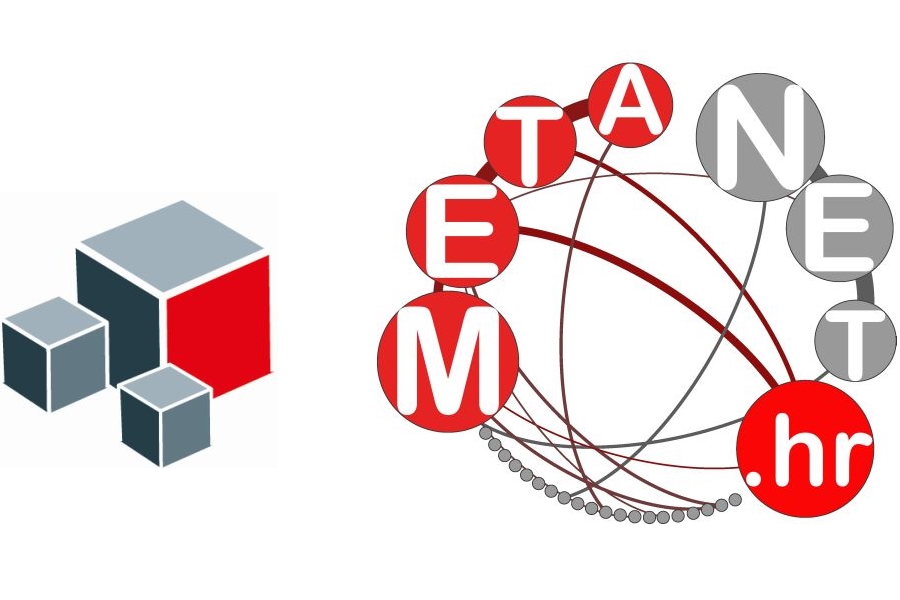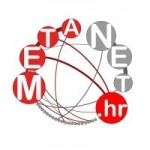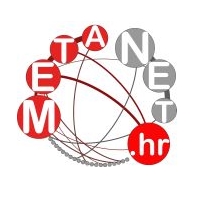RaAM-endorsed event
Institute of Croatian Language and Linguistics and
Croatian Institute of History
are organizing
Cognitive Linguistics Symposium and Round Table
Building Figurative Language Repositories
Methods, Risks, and Challenges
Zagreb, Croatia, May 27th–28th 2016
The symposium is financially supported by the
Croatian Science Foundation under project 3624
Croatian Metaphor Repository
Keynote speakers:
Eve Sweetser, University of California, Berkeley (USA)
George Lakoff, University of California, Berkeley (USA) (video-link)
Invited speakers:
Antonio Barcelona, University of Cordoba (Spain)
Mario Brdar, University of Osijek (Croatia)
Rita Brdar-Szabó, Eötvös Loránd University, Budapest (Hungary)
Zoltán Kövecses, Eötvös Loránd University, Budapest (Hungary)
Klaus-Uwe Panther, University of Hamburg (German)
Günter Radden, University of Hamburg (Germany)
Linda Thornburg, Kendal (UK)
Tony Veale, University College Dublin (Ireland)
Scientific Committee
Eve Sweetser (University of California, Berkeley)
Milena Žic Fuchs (University of Zagreb)
Mario Brdar (University of Osijek)
Ida Raffaelli (University of Zagreb)
Kristina Štrkalj Despot (Institute of Croatian Language and Linguistics)
Organizing Committee
Kristina Štrkalj Despot (Institute of Croatian Language and Linguistics)
Mario Brdar (University of Osijek)
Mario Essert (University of Zagreb)
Mirjana Tonković (University of Zagreb)
Benedikt Perak (University of Rijeka)
Ana Ostroški Anić (Institute of Croatian Language and Linguistics)
Bruno Nahod (Institute of Croatian Language and Linguistics).
Ivan Pandžić (Institute of Croatian Language and Linguistics)
Ivana Brač (Institute of Croatian Language and Linguistics)
This symposium gathers a number of top cognitive linguists whose main research interests involve conceptual metaphor and metonymy theory and/or neural theory of language at an interactive and productive series of talks and discussions.
The invited speakers will present some of the most recent and prominent endeavors in this area and provide a variety of approaches to the topic. The focus will be on interdisciplinary methods of research that lead towards the building of figurative language repositories (i.e. repositories of cognitive primitives, image schemas, frames, conceptual metaphors, and metonymies), such as the most prominent MetaNet: A Multilingual Metaphor Repository project housed at the International Computer Science Institute in Berkeley, California, or its sister project Croatian Metaphor Repository, housed at the Institute of Croatian Language and Linguistics. Such repositories are a prerequisite for building a computer system capable of understanding metaphors and figurative language.
The symposium will also feature a round table discussion on the methods, risks, and challenges of building such repositories.
The symposium will hopefully result in the proposal of a joint multidisciplinary project to build a multilingual multilayered lexical and semantic repository that will bring together cognitive science, linguistics, computational science, and psychology with the aim of advancing artificial intelligence research.
We invite scholars who feel they can contribute to the topic with a 30-minute talk as part of the invited talks session to send an abstract (up to 400 words excluding references) to Kristina Despot (kdespot@ihjj.hr) no later than March 1st. The Scientific Committee will select three talks to be presented at the symposium and published in the symposium proceedings. Notification of acceptance/rejection will be sent by March 15th.
If you are interested in attending this event and taking part in the round table, please register via email to Ivan Pandžić (ipandzic@ihjj.hr) no later than May 1st.
Venue, Location and Travel Information
The symposium will be held in Zagreb, in the gorgeous Golden Hall of the Croatian Institute of History (http://www.isp.hr/en/).
Zagreb – city with a million hearts
The city of Zagreb, capital of Croatia, on the historic and political threshold between East and West, illustrates both the continental and Mediterranean spirit of the nation it spearheads. Zagreb is the cultural, scientific, economic, political and administrative centre of the Republic of Croatia, and is home to the Croatian Parliament, Government and President. Its favourable location between the Pannonian plain, the edge of the Alps and the Dinaric range has allowed it to become a crossing point for mass international communication.
The city is protected from the cold northern winds by the mountain of Medvednica and opens up to the rest of the world thanks to a spacious plain and the Sava river. Zagreb, with a population of nearly one million, contains almost a quarter of the entire population of Croatia. Over the centuries, the city was inhabited by people coming from all over Europe; and, in recent years, by people coming from different parts of Croatia, ensuring a rich cultural life. Zagreb is a safe city whose doors are always open; a city with a tumultuous history teeming with interesting personalities; a city that warmly invites all those who wish to get to know it, and a city that will surely fulfill your expectations. In this city, you can easily meet remarkable people, make new friends and enjoy special moments. The façades of Zagreb’s buildings reflect the ebb and flow of history, while its streets and squares bear witness to the coming together of the many cultures that have shaped the identity of this laid-back capital. The best thing to do is when you first arrive is to take in Zagreb’s wonderful atmosphere, which, as many claim, is only surpassed by the legendary beauty of the local womenfolk.
More about Zagreb on http://www.infozagreb.hr/
Travel Information
How to get from Zagreb Airport to Zagreb?
Bus transportation – Pleso Prijevoz (Zagreb)
Once you’ve arrived at Zagreb Airport, the bus of transportation company Pleso Prijevoz is there to take you to Zagreb. They offer a bus service between the airport (Zračna luka) and the bus station (Autobusni kolodvor) of Zagreb. The bus runs every day of the week, two times per hour. Travel time between the two places is 30 minutes. The bus station in Zagreb is a 15-minute walk from the main railway station and 20 minutes by foot from the city centre. According to the timetable, the last bus leaves at 8 p.m. from Zagreb Airport. Nevertheless, for passengers arriving late there is also bus transportation arranged. Please consult website and timetable Pleso Prijevoz.
| Prices | Single | Return |
| Adults | 30 HRK (cca 4 EUR) | 60 HRK (cca 8 EUR) |
| Children | 30 HRK (cca 4 EUR) | 60 HRK (cca 8 EUR) |
How much is the taxi fare to and from Zagreb?
A taxi ride to the centre of Zagreb costs at least 150 HRK (cca 20 EUR), with baggage costing 3 HRK (0.5 EUR) each. Make a taxi reservation Zagreb Airport through YATTAXI, an online booking platform for reliable and reasonable priced airport transfers.
Accomodation
Search hotels in Zagreb and book easily online through Booking.com, no reservation fees! Wimdu is an online platform offering rental accommodations that will make you feel and live like a local, search for a private accommodation in Zagreb.
See also http://www.infozagreb.hr/travel-plan/accommodation and AirBNB.
PRELIMINARY PROGRAMME
FRIDAY
May 27th
9.00-9.30 Opening ceremony
KEYNOTE
9.30-11.00 Eve Sweetser
Deep semantics, frame ontologies, and metaphor analysis
11.00-11.15 Coffee break
PLENARY SESSION
11.15-12.15 Mario Brdar, Rita Brdar-Szabó and Benedikt Perak
Metaphor repositories and cross-linguistic comparison: ontological eggs and chickens
12.15-13.15 Zoltán Kövecses
Ways of Studying Metaphors in Cognitive Linguistics: the Lexical vs. the Corpus-Linguistic view. Which One is “Better”?
13.15-15.00 Buffet lunch
15.00-16.00 Tony Veale
Metaphor in the Age of Mechanical Production
16.00-16.20 Coffee break
ROUND TABLE
16.20-19.00 Round Table
Figurative Language Repositories: Methods, Risks and Challenges
Ida Raffaelli, chairperson
KEYNOTE
16.20-17.00 George Lakoff (video link)
Figurative Language Repositories: Methods, Risks and Challenges
17.00-17.20 Milena Žic Fuchs and Miloš Judaš
Figurative Language and Neuroscience?
17.20-17.40 Inna Skrynnikova: Methods and Challenges of Analysing Political Metaphors from Cross- Linguistic Perspective
17.40-18.00 Anita Peti Stantić
(Mental) Grammar within the (Mental) Lexicon
18.00-19.00 Discussion
Invited participants:
Branimir Belaj, Maja Brala-Vukanović, Mario Essert, Renata Geld, Bruno Nahod, Julia Ostanina Olszewska, Ivan Pandžić, Alexandra Sopina, Diana Stolac, Mirjana Tonković
19.30 Conference Dinner
SATURDAY
May 28th
9.10-9.30 Good morning coffee
PLENARY SESSION
9.30-10.30 Günter Radden
Metonymy
10.30-11.30 Linda Thornburg and Klaus-Uwe Panther
Figurative Reasoning in Hedged Performatives
11.30-11.50 Coffee break
11.50-12.50 Antonio Barcelona:
The University of Córdoba Metonymy Database
12.50-14.30 Buffet lunch
14.30-15.10 Kristina Štrkalj Despot
Croatian Metaphor Repository: Combining a Theory-Driven Top-Down Approach with a Bottom-Up Corpus Based Approach
15.10-15.50 Marianna Bolognesi
Vismet 1.0: an Online Annotated Corpus of Visual Metaphors
15.50-16.30 Simon Devylder
Mereology in the Flesh
16.30-16.50 Coffee break
ROUND TABLE
16.50-19.15 Round Table
Ida Raffaelli, chairperson
16.50-17.10 Marko Tadić
17.10-17.30 Mohsen Bakhtiar: Cultural Model of Hayâ ‘Shame’ in Persian
17.30-17.50 Mateusz-Milan Stanojević: Evaluative Aspects of Metaphor in Discourse and its Consequences for Metaphor Repositories
17.50-18.10 Tanja Gradečak Erdeljić, Goran Milić: Floods or Flows? – Conceptual Metaphors in Reports on Refugees in Croatia
18.10-19.00 Discussion
Branimir Belaj, Maja Brala-Vukanović, Mario Essert, Renata Geld, Bruno Nahod, Julia Ostanina Olszewska, Ivan Pandžić, Alexandra Sopina, Diana Stolac, Mirjana Tonković
19.00 Closing ceremony
SUNDAY
May 29th
10.00 Guided city tour




